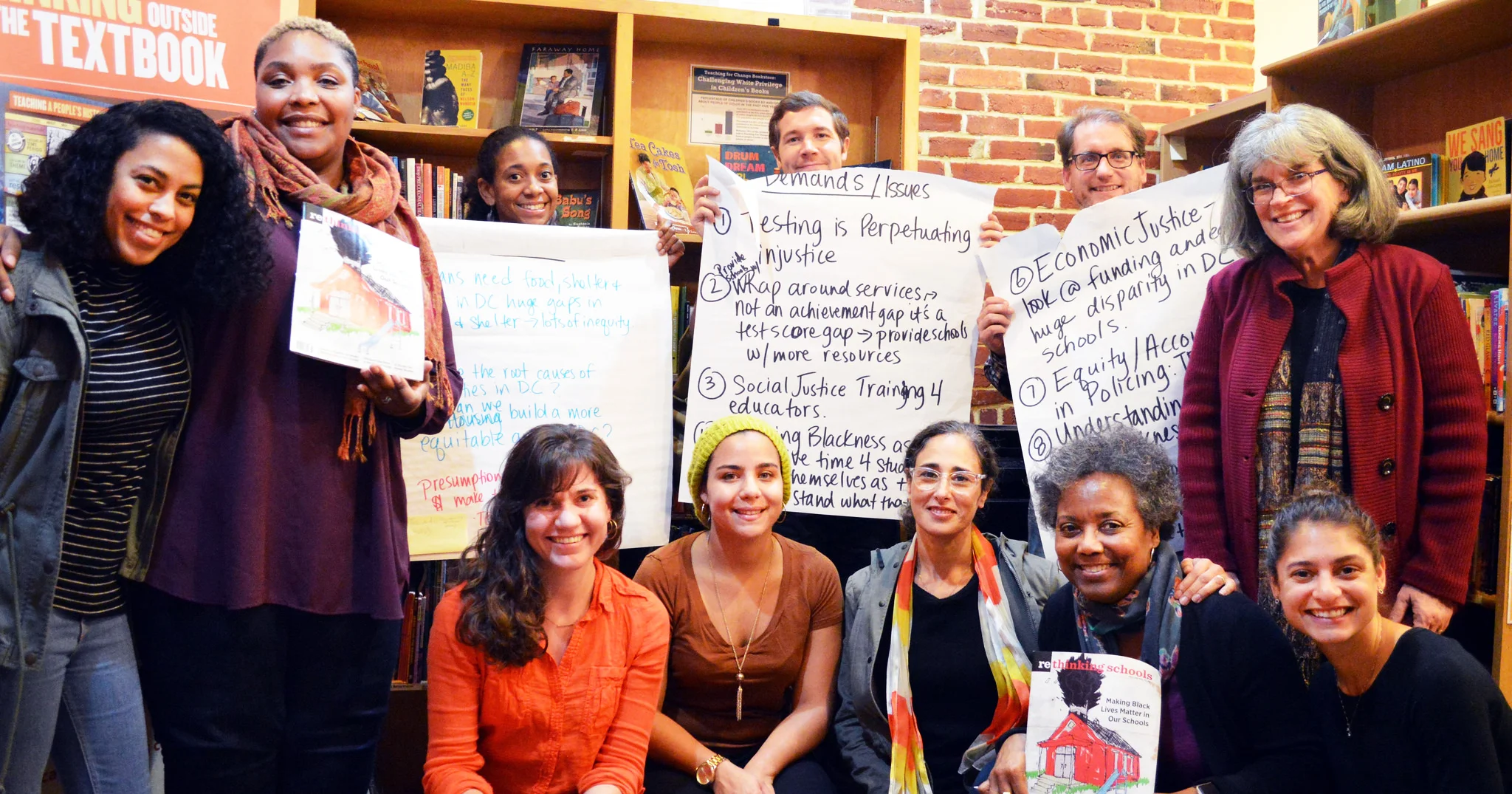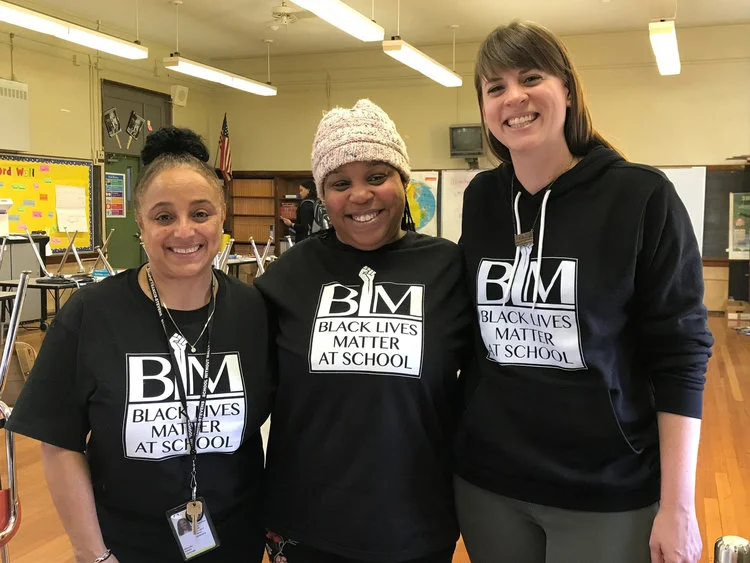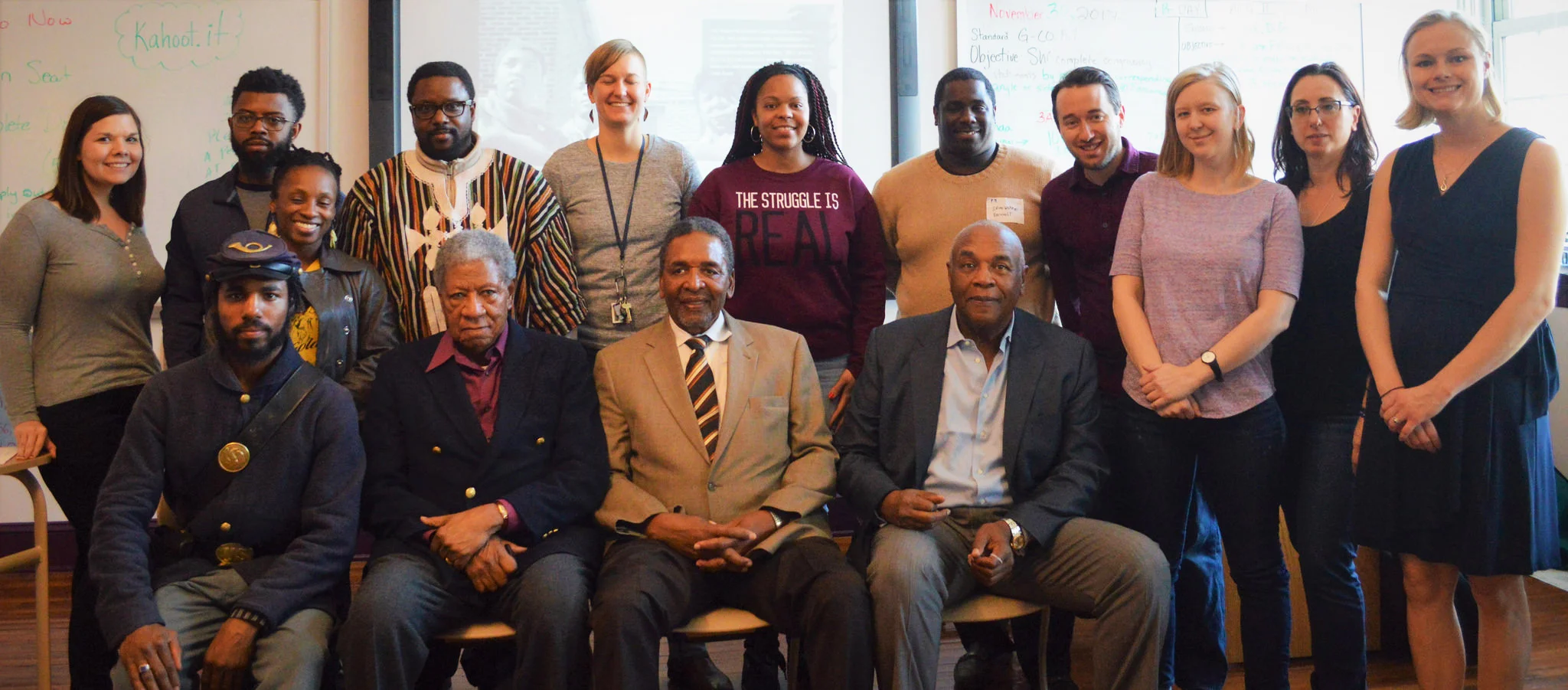Highlights from Year One of D.C. Area Educators for Social Justice
On our one year anniversary, we share highlights from our accomplishments.
In the spring of 2017, Teaching for Change contacted social justice educator networks from around the country to collect ideas about what they did and how they were organized. We then held focus groups to explore those ideas and shape the vision for the DC Area Educators for Social Justice, and formed an advisory group. Faye Colon led this inaugural year of establishing, nurturing, and documenting the D.C. Area Educators for Social Justice.
Rapid Response
After the violent white nationalist rally in Charlottesville in August, we collected and posted stories about how teachers responded in the classroom. Gabby Arca described the monuments her third graders made out of foil paper that represented the positive rules of respect they wanted for their community.
After the President's threats to end Deferred Action for Childhood Arrivals (DACA) in early September, we convened a weekend session for teachers to share and develop strategies. One teacher wrote, that the session gave her “A way to connect my activism to my work.”
Teacher Convenings
Our first public event was the Indigenous People’s Day Curriculum Night with three teachers, three high school students, and a representative from the National Museum of the American Indian. Teachers shared their lessons and students described their campaign to #AbolishColumbusDay and establish Indigenous People’s Day.
In the spring, close to 100 D.C. area educators filled the Blackburn Center at Howard University for a teach-in on the hidden history and relevance today of Reconstruction.
We also hosted popular events for teachers with noted authors. Dr. Marcia Chatelain discussed tools to create inclusive classrooms. Paul Ortiz discussed his new book An African American and Latinx History of the United States with teachers during the Black Lives Matter Week of Action in Schools. Dr. Ibram Kendi's talk to teachers focused on lessons educators can draw from his book Stamped from the Beginning: The Definitive History of Racist Ideas in America. One teacher shared,
This discussion challenged my own thought process about compounding stereotypes and racist history. This is a good way to think through questions for the classroom and how to share these points with students.
Central America in the Classroom
We offered a three session course on Central America for Alexandria Public School teachers. One of the participants noted that in addition to learning the history of where the majority of her students come from, “Thank you for giving us time to plan and bounce ideas off of each other.”
With support from DCPS, we took our Central America lessons to Ballou, Dunbar, and Roosevelt High Schools during Latinx Heritage Month. Here is just some of what students learned:
The guerrilla wars my father fought in [in El Salvador] had more American involvement than I thought.
I learned that people can get assassinated for doing the right thing.
I learned that there are a lot of brave and powerful leaders in Central America.
Instead of being taught false history we should be taught the untold truth.
Curriculum Working Groups
We hosted a series of sessions for teachers to share ideas and develop lessons on Central America. After two very successful teacher workshops with Sheldon Scott on race and representation and gender, bias, and stereotypes in children's literature, we launched a new curriculum group on anti-bias early childhood education. One of the participants said, “Every meeting/training like this gives me renewed spirit to address these issues with students and colleagues.”
Black Lives Matter Week of Action
After a series of meetings in the fall and winter to engage teachers citywide, Teaching for Change and colleagues from the Center for Inspired Teaching turned the tables on the traditional curriculum by bringing Black Lives Matter lessons to more than 100 pre-K to 12 classrooms during the Black Lives Matter Week of Action in Schools.
Each day explored two to three of the Black Lives Matter movement thirteen guiding principles. In school, teachers across the area implemented Black Lives Matter Week of Action curriculum designed for pre-K through 12th-grade classrooms. In the evening, there were events for educators, students, stakeholders, and community members to actively engage in the movement.One second grader remarked, “Black Lives Matter is like the Civil Rights Movement.” One eighth grader reacted, “It means a whole lot that our school is honoring Black lives because I like to fight for justice.”
Workshops for the Smithsonian Institution
Teaching for Change developed and offered teacher workshops for the National Museum of the American Indian, Anacostia Museum (on Central America and D.C. history), the Portrait Gallery, and the American Art Museum. In each case, the partnerships developed with the museums will continue for years to come.
Classroom Visits and Stories
Faye visited dozens of classrooms and wrote stories about the lessons she saw. This helped give visibility to social justice teaching – helping to recognize and share the approaches of many powerful D.C. area teachers. These included lessons on Columbus, Central America, and the Civil Rights Movement.
Special Guests in Classrooms
We organized visits by film directors to four classrooms in collaboration with the International Filmfest (including short films on Puerto Rico and a film by Toni Morrison’s son) and go-go artists. After the film about Puerto Rico, Mr. Rubenstein asked the second grade students, what rule can we change to make it easier to help Puerto Ricans? In response, one student referenced the temporary lift of the Jones Act, “Change the rule that says Puerto Rico can only get help for ten days. They should have been able to get help for ten months!”
SNCC Digital Gateway Collaboration
We coordinated three sessions to introduce teachers to the new documentary website about the Student Nonviolent Coordinating Committee. After each session, teachers left with ideas and resources to bring the grassroots history of the Civil Rights Movement to their classroom. One DC teachers noted, “I was amazed to find my uncle on the SNCC Digital Gateway site. I never knew he had been that actively involved.”
And more
Sessions for our Stories from Our Classrooms teacher alumni
Presentations on Teaching for Change to area teacher education courses
Workshops at conferences including MELFIN and the Middle States Conference
Panels about education
And much more!
We had an enormously successful launch to this long overdue network in the D.C. area and have laid a firm foundation for the years ahead.





